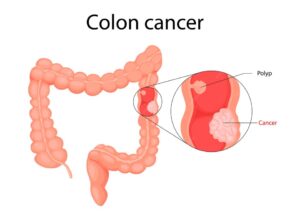
Colon cancer, also known as colorectal cancer, is a significant health concern that affects thousands of people worldwide. While it may seem daunting, early detection and treatment can make a huge difference in managing the disease. This article answers some of the most common questions about colon cancer to help you stay informed and proactive. Remember, consulting a gastroenterologist in Surat can provide personalized guidance and care.
1. What Exactly Is Colon Cancer?
Colon cancer develops in the large intestine (colon) or rectum, typically starting as small, benign growths called polyps. Over time, some polyps can turn cancerous if left untreated. Regular screenings can help detect and remove these polyps early, reducing the risk of cancer development.
2. What Are the Common Symptoms of Colon Cancer?
Colon cancer symptoms can vary, but the most common signs include:
- Changes in bowel habits (like persistent diarrhea, constipation, or narrowing of stools).
- Blood in the stool or rectal bleeding.
- Ongoing abdominal discomfort, including cramps or bloating.
- Feeling like your bowel doesn’t empty completely.
- Fatigue, weakness, or unexplained weight loss.
If you experience these symptoms, don’t ignore them. Early detection is key to successful treatment.
3. Who Is at Risk for Colon Cancer?
Certain factors can increase your risk of developing colon cancer:
- Age: It’s more common in people over 50, though younger adults can also be affected.
- Lifestyle Choices: Diets high in red or processed meat, lack of physical activity, smoking, and excessive alcohol use can increase your risk.
- Family History: If a close relative has had colon cancer, your risk is higher.
- Health Conditions: Conditions like inflammatory bowel disease (IBD), Crohn’s disease, or ulcerative colitis also elevate the risk.
Making lifestyle changes and staying vigilant with screenings can help mitigate these risks.
4. How Is Colon Cancer Diagnosed?
Diagnosis usually involves a combination of tests, including:
- Colonoscopy: A procedure where a thin, flexible tube with a camera examines the colon. Polyps can also be removed during this procedure.
- Imaging Tests: CT scans or MRIs provide detailed views of the colon.
- Stool Tests: These detect hidden blood or abnormal DNA in your stool.
- Biopsy: If abnormalities are found, a sample of tissue may be taken for further analysis.
Your doctor will recommend the best diagnostic approach based on your symptoms and health history.
5. Can Colon Cancer Be Prevented?
While it’s impossible to completely prevent colon cancer, certain steps can significantly lower your risk:
- Regular Screenings: Detect polyps early before they turn cancerous.
- Healthy Diet: Include more fruits, vegetables, and whole grains while cutting back on red and processed meats.
- Stay Active: Regular exercise helps maintain overall health and reduces cancer risk.
- Avoid Smoking and Excessive Alcohol: Both habits are linked to a higher risk of colon cancer.
6. What Are the Stages of Colon Cancer?
Colon cancer progresses through the following stages:
- Stage 0: Cancer is confined to the inner lining of the colon.
- Stage I: Cancer has grown into the colon wall but hasn’t spread further.
- Stage II: Cancer has grown through the wall but hasn’t reached lymph nodes.
- Stage III: Cancer has spread to nearby lymph nodes.
- Stage IV: Cancer has metastasized to other organs, such as the liver or lungs.
Early detection is crucial as treatment success rates are significantly higher in the earlier stages.
7. What Are the Treatment Options for Colon Cancer?
Treatment varies depending on the stage of cancer and the patient’s overall health. Common options include:
- Surgery: Removes cancerous parts of the colon. It’s often the first step for early-stage cancer.
- Chemotherapy: Uses drugs to target and kill cancer cells, typically for advanced stages.
- Radiation Therapy: High-energy beams are used to destroy cancer cells, often combined with other treatments.
- Targeted Therapy: Focuses on specific proteins or genes in cancer cells to stop their growth.
- Immunotherapy: Helps your immune system recognize and attack cancer cells.
Your doctor will create a treatment plan tailored to your specific condition.
8. How Can Regular Screenings Help?
Screenings are one of the most effective ways to detect colon cancer early or even prevent it. A colonoscopy can identify and remove polyps before they become cancerous. Screening is generally recommended starting at age 45, or earlier if you have a family history or other risk factors.
9. What Should You Do If You’re Diagnosed with Colon Cancer?
A diagnosis of colon cancer can be overwhelming, but there are steps you can take to manage the journey:
- Seek Expert Care: Work with a qualified colorectal surgeon and oncology team.
- Stay Positive: Many people recover fully, especially with early diagnosis and treatment.
- Build a Support Network: Friends, family, and support groups can provide emotional and practical support.
- Focus on Your Health: Follow your doctor’s advice on diet, exercise, and stress management during and after treatment.
Final Thoughts
Colon cancer is a serious condition, but with the right information and proactive care, it’s manageable. By understanding the symptoms, risks, and treatment options, you can take control of your health.
For personalized care and expert guidance, consulting the best colorectal surgeon in Surat can make all the difference. Early detection and a tailored treatment plan are your best tools in the fight against colon cancer.
